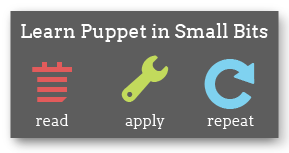Custom Functions
Extend the Puppet interpreter by writing your own custom functions.
Writing your own functions
The Puppet language and interpreter is very extensible. One of the places you can extend Puppet is in creating new functions to be executed on the puppet master at the time that the manifest is compiled. To give you an idea of what you can do with these functions, the built-in template and include functions are implemented in exactly the same way as the functions you’re learning to write here.
Custom functions are written in Ruby, so you’ll need a working understanding of the language before you begin.
Gotchas
There are a few things that can trip you up when you’re writing your functions:
- Your function will be executed on the server. This means that any files or other resources you reference must be available on the server, and you can’t do anything that requires direct access to the client machine.
- There are actually two completely different types of functions
available — rvalues (which return a value) and statements
(which do not). If you are writing an rvalue function, you must pass
:type => :rvaluewhen creating the function; see the examples below. - The name of the file containing your function must be the same as the name of function; otherwise it won’t get automatically loaded.
- To use a fact about a client, use
lookupvar('{fact name}')instead ofFacter['{fact name}'].value. If the fact does not exist,lookupvarreturns:undefined. See examples below.
Where to put your functions
Functions are implemented in individual .rb files (whose filenames must match the names of their respective functions), and should be distributed in modules. Put custom functions in the lib/puppet/parser/functions subdirectory of your module; see Plugins in Modules for additional details (including compatibility with versions of Puppet prior to 0.25.0).
If you are using a version of Puppet prior to 0.24.0, or have some other compelling reason to not use plugins in modules, functions can also be loaded from .rb files in the following locations:
$libdir/puppet/parser/functionspuppet/parser/functionssub-directories in your Ruby$LOAD_PATH
First Function — small steps
New functions are defined by executing the newfunction method
inside the Puppet::Parser::Functions module. You pass the name of
the function as a symbol to newfunction, and the code to be run as
a block. So a trivial function to write a string to a file in /tmp
might look like this:
module Puppet::Parser::Functions
newfunction(:write_line_to_file) do |args|
filename = args[0]
str = args[1]
File.open(filename, 'a') {|fd| fd.puts str }
end
end
To use this function, it’s as simple as using it in your manifest:
write_line_to_file('/tmp/some_file', "Hello world!")
(Note that this is not a useful function by any stretch of the imagination.)
The arguments to the function are passed into the block via the
args argument to the block. This is simply an array of all of the
arguments given in the manifest when the function is called.
There’s no real parameter validation, so you’ll need to do that
yourself.
This simple write_line_to_file function is an example of a
statement function. It performs an action, and does not return a
value. The other type of function
is an rvalue function, which you must use in a context which
requires a value, such as an if statement, a case statement, or a
variable or attribute assignment. You could implement a rand
function like this:
module Puppet::Parser::Functions
newfunction(:rand, :type => :rvalue) do |args|
rand(vals.empty? ? 0 : args[0])
end
end
This function works identically to the Ruby built-in rand function.
Randomising things isn’t quite as useful as you might think,
though. The first use for a rand function that springs to mind is
probably to vary the minute of a cron job. For instance, to stop
all your machines from running a job at the same time, you might do
something like:
cron { run_some_job_at_a_random_time:
command => "/usr/local/sbin/some_job",
minute => rand(60)
}
But the problem here is quite simple: every time the Puppet client runs, the rand function gets re-evaluated, and your cron job moves around. The moral: just because a function seems like a good idea, don’t be so quick to assume that it’ll be the answer to all your problems.
Using Facts and Variables
Which raises the question: what should you do if you want to splay your cron jobs on different machines? The trick is to tie the minute value to something that’s invariant in time, but different across machines. Perhaps the MD5 hash of the hostname, modulo 60, or maybe the IP address of the host converted to an integer, modulo 60. Neither guarantees uniqueness, but you can’t really expect that with a range of no more than 60 anyway.
But given that functions are run on the puppet master, how do you get at the hostname or IP address of the agent node? The answer is that facts returned by facter can be used in our functions.
Example 1
require 'ipaddr'
module Puppet::Parser::Functions
newfunction(:minute_from_address, :type => :rvalue) do |args|
IPAddr.new(lookupvar('ipaddress')).to_i % 60
end
end
Example 2
require 'md5'
module Puppet::Parser::Functions
newfunction(:hour_from_fqdn, :type => :rvalue) do |args|
MD5.new(lookupvar('fqdn')).to_s.hex % 24
end
end
Example 3
module Puppet::Parser::Functions
newfunction(:has_fact, :type => :rvalue) do |arg|
lookupvar(arg[0]) != :undefined
end
end
Basically, to get a fact’s or variable’s value, you just call
lookupvar('{fact name}').
Calling Functions from Functions
Functions can be accessed from other functions by
calling Puppet::Parser::Functions.autoloader.loadall at the beginning of your new function, then prepending function_ to the name of the function you are trying to call. Alternatively, you can load a specific function by calling Puppet::Parser::Functions.function('myfunc1')
Also keep in mind that when calling a puppet function from the puppet DSL, arguments are all passed in as an anonymous array. This is not the case when calling the function from within Ruby. To work around this, you must create the anonymous array yourself by putting the arguments (even if there is only one argument) inside square brackets like this:
[ arg1, arg1, arg3 ]
Example
module Puppet::Parser::Functions
newfunction(:myfunc2, :type => :rvalue) do |args|
Puppet::Parser::Functions.autoloader.loadall
function_myfunc1( [ arg1, arg2, ... ] )
end
end
Handling Errors
To throw a parse/compile error in your function, in a similar
manner to the fail() function:
raise Puppet::ParseError, "my error"
Troubleshooting Functions
If you’re experiencing problems with your functions loading, there’s a couple of things you can do to see what might be causing the issue:
1 - Make sure your function is parsing correctly, by running:
ruby -rpuppet my_funct.rb
This should return nothing if the function is parsing correctly, otherwise you’ll get an exception which should help troubleshoot the problem.
2 - Check that the function is available to Puppet:
irb
> require 'puppet'
> require '/path/to/puppet/functions/my_funct.rb'
> Puppet::Parser::Functions.function(:my_funct)
=> "function_my_funct"
Substitute :my_funct with the name of your function, and it should
return something similar to “function_my_funct” if the function
is seen by Puppet. Otherwise it will just return false, indicating
that you still have a problem (and you’ll more than likely get a
“Unknown Function” error on your clients).
Referencing Custom Functions In Templates
To call a custom function within a Puppet Template, you can do:
<%= scope.function_namegoeshere(["one","two"]) %>
Replace “namegoeshere” with the function name, and even if there is only one argument, still include the array brackets.
Notes on Backward Compatibility
Accessing Files With Older Versions of Puppet
In Puppet 2.6.0 and later, functions can access files with the expectation that it will just work. In versions prior to 2.6.0, functions that accessed files had to explicitly warn the parser to recompile the configuration if the files they relied on changed.
If you find yourself needing to write custom functions for older versions of Puppet, the relevant instructions are preserved below.
Accessing Files in Puppet 0.23.2 through 0.24.9
Until Puppet 0.25.0, safe file access was achieved by adding self.interp.newfile($filename) to the function. E.g., to accept a file name and return the last line of that file:
module Puppet::Parser::Functions
newfunction(:file_last_line, :type => :rvalue) do |args|
self.interp.newfile(args[0])
lines = IO.readlines(args[0])
lines[lines.length - 1]
end
end
Accessing Files in Puppet 0.25.x
In release 0.25.0, the necessary code changed to:
parser = Puppet::Parser::Parser.new(environment)
parser.watch_file($filename)
This new code was used identically to the older code:
module Puppet::Parser::Functions
newfunction(:file_last_line, :type => :rvalue) do |args|
parser = Puppet::Parser::Parser.new(environment)
parser.watch_file($filename)
lines = IO.readlines(args[0])
lines[lines.length - 1]
end
end

